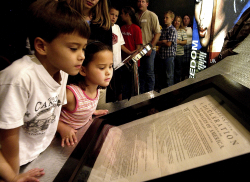
In recent years, states across the nation have pushed to take racist “diversity, equity, and inclusion” principles out of the classroom. But their approach—which utilizes “divisive concepts” laws—has proved ineffective. Now, the Trump administration is showing a more effective path: labeling DEI ideas as part of a “hostile learning environment.”
Idaho, which passed the first “divisive concepts” legislation in 2021, made it illegal for schools to require students to affirm the inherent superiority or inferiority of one race or sex over another. Twenty states have passed similar laws, with varying definitions and enforcement mechanisms.
Finally, a reason to check your email.
Sign up for our free newsletter today.
Educators and Democrats have condemned each law as the dawn of a new era of McCarthyism or the death of academic freedom. “The call for removing [DEI measures] from schools in favor of ‘traditional American values’ is indistinguishable from the post-Civil War South advocating to rewrite history with the ‘Lost Cause’ narrative,” said Pennsylvania representative Summer Lee while questioning Secretary of Education Linda McMahon during recent congressional hearings. Teaching about Jim Crow laws or the Tulsa Massacre would run afoul of bans on DEI, Lee claimed.
Yet, divisive-concepts laws rarely if ever result in legal action. They are toothless, either because they are too vague and hard to enforce, or because state executives don’t want to challenge the education establishment. Courts have overturned them in some states, such as Arizona and New Hampshire. Lawsuits are pending in four more.
The Trump administration’s approach is both bolder than these state efforts and more grounded in our current legal regime. The administration has claimed that certain teaching techniques, school policies, or curricula could make for a hostile environment under Title VI of the Civil Rights Act. Such harassment based on race, gender, or national origin is actionable when it is “sufficiently severe, pervasive, or persistent to limit a student’s educational opportunities.”
While Title VI enforcement was traditionally aimed at forcing schools to take action to prevent racial slurs or persistent derogatory comments against minorities, Secretary McMahon has adopted a colorblind approach to identifying hostile learning environments. Today, politicized curricula and pedagogy mean that whites, males, and Christians often must endure such environments.
Teaching about the Holocaust, American slavery, or the Tulsa race riots is still permitted, of course. But smuggling into any of these topics the idea that, for instance, Christians are collectively guilty for the Holocaust, or that whites are inherently racist, creates a hostile learning environment.
To claim that members of a race, nationality, or religion are inherently guilty is a slur. When such slurs appear in public school curricula or classrooms, their state sanction arguably makes them worse than individual acts of antagonism. Some critics argue that these laws suppress legitimate pedagogy, but in reality, teachers can teach about Rosa Parks without promoting the theory of white privilege—just as they can teach the Holocaust without condemning Christianity or Western civilization as inherently anti-Semitic.
McMahon has taken a widely accepted legal category and applied it in ways that put the education establishment on the defensive. DEI policies have already been shown to create adversarial workplaces. There is plenty of evidence to suggest that DEI policies in public school curricula create such learning environments, as well.
McMahon’s regulation champions equal treatment. Either these laws and regulations should be applied equally, or the very concept of “hostile learning environment” should be expunged from the code of law.
Photo: PeopleImages / iStock / Getty Images Plus
City Journal is a publication of the Manhattan Institute for Policy Research (MI), a leading free-market think tank. Are you interested in supporting the magazine? As a 501(c)(3) nonprofit, donations in support of MI and City Journal are fully tax-deductible as provided by law (EIN #13-2912529).
Source link

















